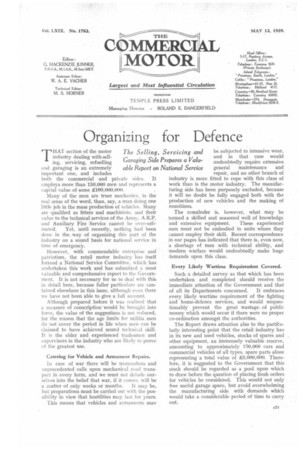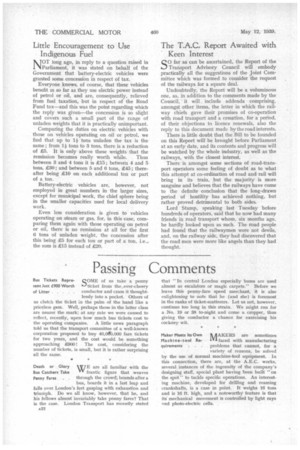Organizing for Defence
Page 23

Page 24

If you've noticed an error in this article please click here to report it so we can fix it.
THAT section of the motor industry dealing with selling, servicing, refuelling and garaging is an extremely important one, and includes both the commercial and private sides. It employs more than 150,000 men and represents a capital value,of some £100,000,000.
Many of the men are truer mechanics, in the real sense of the word, than, say, a man doing one little job in the mass production of vehicles. Many are qualified as fitters and machinists, and their value to the technical services of the Army, A.R.P. and Auxiliary Fire Service cannot he over-esti mated. Yet, until recently, nothing had been done in the way of organizing this part of the industry on a sound basis for national service in time of emergency.
However, with commendable enterprise and patriotism, the retail motor industry has itself formed a National Service Committee, which has undertaken this work and has submitted a most valuable and comprehensive report to the Government. It is not necessary for us to deal with this in detail here, because fuller particulars are contained elsewhere in this issue, although even there we have not been able to give a full acconnt.
Although prepared before it was realized that a measure of conscription' would be brought into force, the value of the suggestions is not reduced, for the reason that the age limits for militia men do not cover the period in life when men can be claimed to have achieved sound technical skill. It is the older and experienced tradesmen and supervisors in the industry who are likely to prove of the greatest use.
Catering for Vehicle and Armament Repairs.
In case of war there will be tremendous and unprecedented calls upon mechanical road transport in every form, and we must not delude ourselves into the belief that war, if it comes, will be a matter of only weeks or months. It may be, but preparations must be carried out with the possibility in view that hostilities may last for years.
This means that vehicles and armaments may be subjected to intensive wear, and in that case would undoubtedly require extensive general maintenance and repair, and no other branch of industry is more fitted to cope with this class of work than is the motor industry. The manufacturing side has been purposely excluded, because it will no doubt be fully engaged both with the production of new vehicles and the making of munitions.
The remainder is, however, what may be termed a skilled and seasoned well of knowledge and extensive equipment. These experienced men must not be embodied in units where they cannot employ their skill. Recent correspondence in our pages has indicated that there is, even now, a shortage of men with technical ability, and modern warfare would undoubtedly make huge demands upon this class.
Every Likely Wartime Requirentent Covered.
Such a detailed survey as that which has been undertaken and completed should receive the immediate attention of the Government and that of all its Departments concerned. It embraces every likely wartime requirement of the fighting and home-defence services, and would unquestionably prevent the great wastage of public money which would occur if there were no proper co-ordination amongst the authorities.
The Report draws attention also to the paraularly interesting point that the retail industry has in its new and used vehicles, stocks of spares and other equipment, an immensely valuable reserve, amounting to approximately 150,000 cars and commercial vehicles of all types, spare parts alone representing a total value of £3,000,000. Therefore, it is suggested to the Government that this stock should be regarded as a pool upon which to draw before the question of placing fresh orders for vehicles be considered. This would not only free useful garage space, but avoid overwhelming the manufacturing side with demands which would take a considerable period of time to carry out. Little Encouragement to Use Indigenous Fuel NOT long ago, in reply to a question raised in Parliament, it was stated on behalf of the Government that battery-electric vehicles were granted some concessian in respect of tax. Everyone knows, of course, that these vehicles benefit m so far as they use electric power instead of petrol or oil, and are, consequently, relieved from fuel taxation, but in respect of the Road Fund tax—and this was the point regarding which the reply was given—the concession is so slight and covers such a small part of the range of unladen weights that it is practically unimportant. Comparing the duties on electric vehicles with those on vehicles operating on oil or petrol, we find that up to 11 tons unladen the tax is the same; from 11 tons to 3 tons, there is a reduction of £5. It is only above these weights that the remission becomes really worth while. Thus between 3 and 4 tons it is £15; between 4 and 5 tons, £30; and between 5 and 6 tons, £45; thereafter being £10 on each additional ton or part of a ton.
Battery-electric vehicles are, however, not employed in great numbers in the larger sizes, except for municipal work, the chief sphere being in the smaller capacities used for local delivery work. Even less consideration is given to vehicles operating on steam or gas, for, in this case, comparing them again with those operating on petrol or oil, there is no remission at all for the first 6 tons of unladen weight, the concession after this being £.5 for each ton or part of a: ton, i.e.,. the sum is £15 instead of £20. The T.A.C. Report Awaited with • Keen Interest SO far as can be ascertained, the Report of the Transport Advisory Council will embody practically all the suggestions of the Joint Committee which was formed to consider the request of the railways for a square deal. Undoubtedly, the Report will be a voluminous one, as, in addition to the comments made by the Council, it will include addenda comprising, amongst other items, the letter in which the railway chiefs gave their promises of co-operation with road transport and a cessation, for a period, of their objections to licence renewals, also the reply to this document made by the road interests. There is little doubt that the Bill to be founded on this Report will he brought before Parliament at an early date, and its contents and progress will be watched by the whole industry, as well as the railways, with the closest interest. There is amongst some sections of road-transport operators some feeling of doubt as to what this attempt at co-ordination of road and rail will bring in its train, but the majority is more sanguine and believes that the railways have come to the definite conclusion that the long-drawn period of hostility has achieved nothing, but rather proved detrimental to both sides. Lord Stamp, speaking last Tuesday 'before hundreds of operators, said that he now had many friends in road transport whom, six months ago, he hardly looked upon as such. The road people had found that the railwaymen were not devils, and, on the railway side, they had discovered that the road men were more like angels than they bad thought.














































































